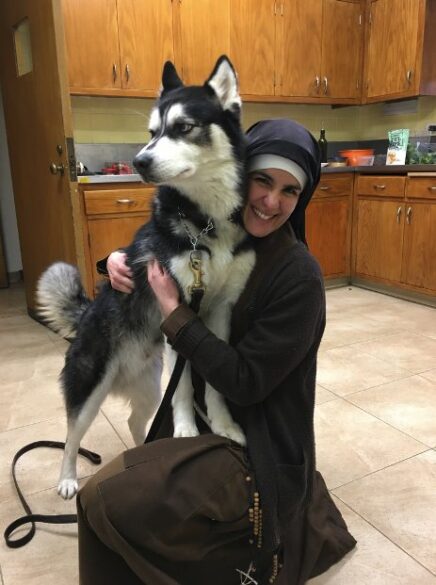GUEST COLUMN
By Sister Alicia Torres
I love dogs. Not like I love my family, or like I love Jesus, but I really do have a strong affection for dogs.
A few months ago, I came home from teaching and was welcomed by an unfamiliar, and rather unpleasant, smell in the convent. Entering our large dining room, I noticed the puppy crate had been set up, and indeed was being used! Little Charlie was about 5 months old and it was love at first sight. Although he really did stink.
Earlier that morning, my religious community was serving over 400 families at our weekly food pantry when – seemingly out of nowhere – Charlie had shown up – soaking wet, muddy and full of friendly energy. Sister Kate noticed that this rather large Siberian Husky puppy was causing distress among our pantry guests and quickly put him on a leash.
When I met him some hours later, Charlie had already been given the first of several (very necessary) baths and was making himself at home. He was all cuddles and kisses. Everyone was his friend, and he made sure you knew you were loved.

Through the neighborhood grapevine we learned that Charlie had been abandoned by his owners. Caring for man’s best friend is not easy: It takes time, attention and resources. The people who had originally owned Charlies must have thought, “Surely the nuns will take care of him.” And we did.
But could we become his forever home?
In religious life (and really all Christian life), a great virtue to cultivate is detachment.
Unfortunately for me, that virtue wasn’t kicking in (nor was I really attempting to foster it) when it came to Charlie. All I wanted was to keep him. But with three German Shepherds, our little Franciscan community already had our hands full, and for all of his positive character traits, there was not one drop of guard dog in Charlie. At the time we had a small renovation project going on in the convent, and not one “stranger” (construction worker) who entered was bereft of a kiss from him.
Six days after he came to us, we were able to locate a proper Husky rescue, and a few weeks after that, we received the good news that Charlie had been adopted – he had found his forever home.
If you and I are honest, we really are looking for the same thing as Charlie, aren’t we? Don’t we have a deep, innate desire for home? And no matter how good it can get this side of heaven, that desire is just never fully satisfied.
During my theology classes, I was blessed to befriend Father Tom Norris, an Irish theologian and a visiting professor to Mundelein Seminary. He had a way of teaching – and storytelling – that could leave one not only stunned but speechless and immobile – as if he could open a wellspring of grace, and you couldn’t help but let yourself be lovingly soaked in the glory. One day, as he was describing the paschal mystery he stated: “Good Friday is when the ‘homeland’ enters exile so that the exiles may enter the ‘homeland.’”
I was totally blown away; I began to realize in a new way that the paschal mystery wasn’t just something that happened 2,000 years ago.
What happened on Good Friday and what was victoriously completed in the resurrection and ascension of Jesus is represented for us in the Eucharist at every Mass. In those moments of consecration – so timeless – we are invited with the priest to truly pray the Mass. In doing so, we enter into something that is real, and truer than anything this side of heaven.
Charlie had to roam for a few months before he found “homeland,” but you and I don’t ever have to wait that long. The forever home we long for begins right here, right now, in every Eucharist.
(Sister Alicia Torres is an executive team member for the National Eucharistic Revival, editor of the Heart of the Revival e-newsletter, and a member of the Franciscans of the Eucharist of Chicago, a religious community that carries out the mission of the church through service to the poor, evangelization and teaching.)
